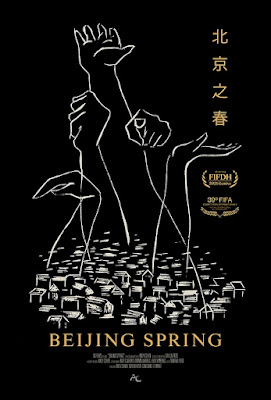Ironically,
the 1980s are largely remembered as a progressive era of openness in China, but
it came to a sudden, violent end in 1989, on the bloody grounds of Tiananmen
Square. The death toll remains unknown, but no serious historian doubts it
numbers in the thousands. The Chinese Communist Party has scrubbed it from the
public consciousness as best they can, but the images of the peaceful protests
and violent crack down remain indelibly etched in the memories of everyone who
watched the live Western television broadcasts. Yet, there is considerably more
to the story. A comprehensive picture of the epochal events emerges through eye-witness
testimony and leaked documents now known as the “Tiananmen Papers” in Tiananmen:
The People Versus The Party¸ directed by Ian MacMillan and co-written by
MacMillan and Audrey Maurion, which premieres this Tuesday on most PBS outlets.
In
early 1989, people could reasonably assume democracy would eventually come to
Mainland China. It was starting to break out nearly everywhere else. After all,
Deng Xiaping was a survivor of the Cultural Revolution, whose son was paralyzed
as a result of Mao’s madness. Yet, several of the on-screen commentators
explain how Deng’s experience led him to be wary of mass movements, such as the
students’ Tiananmen demonstrations. Buzz words like “turmoil” held great
significance for him.
Hopefully,
most viewers already understand how the demonstrations were ignited by the
death and subsequent state funeral for Hu Yaobang, a reformer unceremoniously
purged by the Party. However, the extent to which every day Beijingers adopted
the students will be a revelation to some Westerners. Essentially, the assault was
not just an action on the Square, but an invasion of the entire city, conducted
by troops dispatched from the provinces, who had to first fight their way
through the barricades erected by the common citizenry to protect the beloved
students. It truly was the People versus the Party.
There
is also a popular conception that the protestors over-played their hand, which is
true to an extent, which became tragically obvious. However, many of the
original protest organizers had a better read on the local situation and advocated
greater caution and eventually evacuation. In fact, those massacred on the
Square disproportionately hailed from the provinces (just like the troops firing
on them).
What
happened was truly a “war crime” as one of the editors of The Tiananmen
Papers points out (with great emotion), but it was even costlier over the
long term. The students who were murdered or imprisoned were the best and
brightest of their generation. Those who took their places are the ones who
toady to power. Deng wanted to crush every last remnant of democratic reformist
dissent and he effectively succeeded. Younger generations have no idea what happened
in Tiananmen Square and their parents are too frightened or too ashamed to tell
them. Yet, the truth is out there.
MacMillan
and Maurion give a gripping, step-by-step account of what happened, conveying a
dramatic sense of the pre-Tiananmen optimism, the euphoric promise of the
protests’ early days, and the shock and terror of the PLA’s assault on the
Square. People Versus Party is an important historical document in its
own right, because it incorporates a great deal of on-camera testimony from
surviving student leaders, including Wuer Kaixi, Shen Tong, Wang Dan, Rose Tang
(who is especially moving and damning in her commentary).
People
Versus Party would
be a significant television event at any time, but it is eerily timely in light
of the recent democracy protests in Hong Kong. Thirty years later, the Party is
arguably even more oppressive and corrupt. Nobody participating in the Tiananmen
Square protests or the Umbrella Protests wanted a revolution, but that might be
the only way to bring democratic reform and transparent governance to the
Chinas.
Regardless,
People Versus Party is an authoritative and sobering work of television history
and journalism. It will bring clarity to most viewers’ understanding of events
thirty years ago, chilling their souls in the process. Very highly recommended,
Tiananmen: The People Versus the Party airs this Tuesday (6/25) on most
PBS stations nationwide.





















